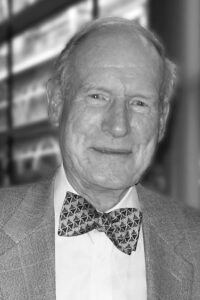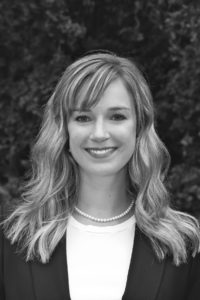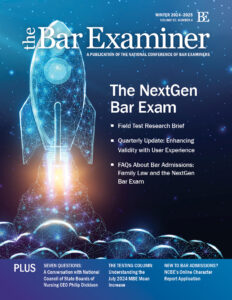This article originally appeared in The Bar Examiner print edition, December 2014 (Vol. 83, No. 4), pp. 64–68. By Fred P. Parker III and Jessica GladCharacter and Fitness
Failure to disclose; unauthorized practice of law
In re Application of Webber, 137 Ohio St. 3d 67, 997 N.E.2d 528 (OH 2013)
Christopher Stanley Christman Webber was licensed in Michigan in 2002. He later applied for admission without examination to the Ohio Bar. In his bar application, he failed to disclose two DUI convictions from the early 1990s in response to the question on the application asking about alcohol- or drug-related traffic charges and convictions. The two DUIs were discovered during the application-verification process. At his interview with a local bar association admissions committee, Webber said that he had answered “no” because he had furnished that information to NCBE in conjunction with his Michigan application and because his sister, who is licensed in Ohio, had told him to answer “no.”
In his application, Webber had also submitted an affidavit averring that he served as corporate counsel for an Ohio corporation located in Ohio beginning in 2009. This job included counseling the company in all litigation, reviewing contracts, and other matters. At a panel hearing on Webber’s application, the panel thought that Webber could have been engaged in the unauthorized practice of law, so it inquired about this employment. Webber said that while he had accepted the position as corporate counsel, he had taken a job in operations with the same company until he could be admitted in Ohio.
The panel questioned him about the undisclosed DUIs and his possible unauthorized practice of law and presented him with the affidavit he had previously submitted. Webber then admitted that he had acted as corporate counsel for some period of time. The panel found it was more than a year since his employer had reported to NCBE in 2010 that he was serving as corporate counsel. The panel recommended that Webber’s application not be approved, and the Board affirmed this decision.
The Ohio Supreme Court denied Webber’s application for admission and ordered that “[u]ntil he is duly admitted to the Ohio bar, he shall not seek admission pro hac vice, register for corporate status, or otherwise practice law in this state.”
Failure to timely update bar application
Florida Board of Bar Examiners re Daniel Mark Zavadil, 123 So. 3d 550 (FL 2013)
Daniel Zavadil filed an application for admission to the Florida Bar in July 2007 and acknowledged the obligation to keep his responses to the application questions current and correct by timely filing amendments to the application. The application states that “an Amendment to Application is timely when filed within 30 days of any occurrence that would change or render incomplete any answer to any question on the application.”
Zavadil passed the Florida bar exam, but the investigation by the Florida Board of Bar Examiners revealed information that reflected adversely on his character and he was asked to appear for an investigative hearing. Following the March 2009 hearing, action was deferred on his application and he was asked to submit a 25-page brief on legal ethics. Zavadil submitted the brief, and on May 4, 2009, he took the oath of admission. Then on April 26, 2010, he was given notice to appear for an additional investigative hearing to determine if a “material misstatement or material omission” had occurred in the application process. Following the July 2010 hearing, the board determined that five specifications should be filed. Zavadil filed an answer, and a formal hearing to revoke his admission was held in July 2011.
Specification 1 dealt with Zavadil’s response to the question as to whether any grievances, charges, or complaints had been filed against him resulting from his practice of any profession, occupation, or engagement in any business. If the answer is “yes,” an explanation must be given. In 2007 Zavadil answered “no.” The board alleged that on November 18, 2008, while Zavadil was working as a police officer in Fort Lauderdale, Florida, he received a letter from the Chief of Police notifying him that he would be suspended for three days in January 2009 because of deficiencies in his performance including discrepancies, omissions, and misinformation in his reports and a pattern of attempting to shift responsibility for his identified deficiencies. The board alleged that Zavadil had committed a material omission in the application process because he failed to timely amend his answer on that question. The board also alleged that Zavadil had filed a complaint in the circuit court challenging the suspension, that the suspension was rescinded by the city of Fort Lauderdale, and that Zavadil had failed to amend his answer to the question to disclose the final disposition of the complaint or charge. Zavadil answered that he had received the November 2008 letter and that he had filed the complaint, but denied that he was required to disclose these events. The board determined that the allegations in specification 1 were proven and disqualified Zavadil for admission to the bar.
Specification 2 concerned the question on the bar application asking whether an applicant had been involved in any court proceedings. The board alleged that Zavadil had filed a complaint for injunctive relief to enjoin the city of Fort Lauderdale from taking disciplinary action against him and made a material omission by not disclosing this proceeding. The board found that these allegations were proven and were disqualifying.
Specification 3 concerned Zavadil’s appearance at an investigative hearing on March 13, 2009, where he failed to amend his answers on the bar application and did not disclose the November 2008 letter or the complaint for injunctive relief. The board found that these allegations were proven and were disqualifying.
Specification 4 dealt with the question on the bar application asking whether the applicant had been discharged or suspended from employment. The board alleged that on March 30, 2009, when Zavadil was working as a police officer, he received a memo from the police chief notifying him that he was relieved from patrol duty with pay, effective immediately, and that he was not permitted to take any official police action, work, wear a uniform, be armed, or operate a police vehicle. The board alleged that he had committed a material omission by not amending his application to disclose the suspension. Zavadil argued that a “relief of duty” is not considered a disciplinary action. After considering the evidence, the board found that the allegations were proven and were disqualifying.
Specification 5 dealt with Zavadil’s application amendment of May 5, 2010, after the board initiated these proceedings. The board alleged that the term in his amendment “of my own volition” was false, misleading, or lacking in candor in that he filed the amendment in response to the board’s notice of the hearing to revoke his admission. Zavadil denied this, but the board determined that the allegations in specification 5 were proven and disqualifying.
Zavadil’s answer to the specifications was to plead the affirmative defense of rehabilitation, and he presented evidence to this and also character witnesses.
The board concluded, based on the evidence presented, that the allegations in the specifications were proven and were grounds for recommending the revocation of Zavadil’s license to practice law in Florida. The board further recommended that Zavadil be disqualified from applying for readmission for a period of 18 months from the date of its findings. Zavadil filed a petition for review.
On review, the Florida Supreme Court noted that the board is charged with the obligation to investigate applicants for admission to the bar and determine whether each applicant has the required character and fitness. The rules outline certain types of conduct that may be cause for further inquiry, including evidence relating to an applicant’s misconduct in employment and neglect of professional obligations. The Court added that if the board had been aware of the November 2008 letter of Zavadil’s supervisor, it is likely these matters would have been investigated prior to making a recommendation regarding Zavadil’s admission. The Court said that “the crucial point is that Zavadil had an obligation to disclose this information to the [b]oard.” Applicants must be candid, and here the applicant failed to inform the board of material information and events. “We have consistently held that ‘no moral character qualification for Bar membership is more important than truthfulness and candor,’” the Court stated.
The Florida Supreme Court approved the board’s findings and recommendations and revoked Daniel Mark Zavadil’s admission to the bar. The revocation is to be effective 30 days from the date the opinion is filed so that he can close his practice. If Zavadil notifies the Court in writing that he is not practicing and does not need 30 days, the Court will enter an order making the revocation effective immediately. Zavadil will be disqualified from reapplying for admission for a period of 18 months from the date of his revocation. In addition, the Court said that Zavadil shall accept no new clients from the date of the opinion until he is readmitted.
Financial irresponsibility; false answers on bar application; rehabilitation
Florida Board of Bar Examiners re B.U.U., 124 So. 3d 172 (FL 2013)
B.U.U. received a J.D. degree in 1998, filed an application to take the Florida bar exam in 2010, and passed the exam in 2011. The investigation by the Florida Board of Bar Examiners revealed information that reflected adversely on her character and fitness. Following an investigative hearing, the board determined that specifications should be filed. Specifications were served, and B.U.U. filed an answer. A hearing was held in November 2012.
Specification 1 involved financial irresponsibility. For the past 12 years B.U.U. had been delinquent in her payments to 12 creditors despite having sufficient income to meet her financial obligations. She had been delinquent in repaying her federal and private student loans used to obtain her legal education. She had also failed to timely file federal tax returns for 2003 and 2007; failed to timely pay federal income taxes owed for 2002, 2004, 2005, and 2006; failed to timely file state income tax returns for 2005 and 2007; and failed to timely pay state income taxes for 2004, 2005, 2006, and 2007. B.U.U. and her spouse filed a petition for Chapter 13 bankruptcy, and a confirmation order with an approved payment plan was entered on May 1, 2007. B.U.U. then voluntarily resigned from her employment, and she and her spouse moved abroad. B.U.U. and her spouse failed and refused to make the scheduled payments set out in the payment plan. The bankruptcy trustee filed six motions to dismiss the bankruptcy case, and the court dismissed the case in March 2010. The board found that B.U.U. and her spouse had sufficient income to make the scheduled payments.
Specification 2 involved providing responses on the Florida bar application that were false, misleading, or lacking in candor; the responses were to questions dealing with delinquency in the payment of any tax or credit obligations. The board found that B.U.U. and her spouse had sufficient income to pay the creditors, but that she chose to spend her earnings on other purchases and to pay for the construction of a residence abroad. This specification also dealt with her explanation for leaving her employment. She stated that she had resigned because of her spouse’s employment transfer to California. The board found that she had left her employment because she claimed that her employer was sexually harassing her and that he was a difficult person to work for.
Specification 3 dealt with B.U.U.’s false testimony that her spouse’s unemployment prevented her from being able to pay her creditors. The board found that B.U.U. had ample income to pay her creditors but willfully chose not to make those payments.
Specification 4 dealt with B.U.U.’s major depressive disorder since 2003, because of which she had been hospitalized on at least two occasions and attempted suicide more than once. She had not complied with her prescribed medication, and her psychiatric medications were being managed by her primary care doctor; she had not been referred to a psychiatrist and was not being treated by a mental health professional. In addition, B.U.U. had not amended her bar application to disclose treatment for her major depressive disorder.
Following the hearing, the board found that the first three specifications, all of which seriously impacted B.U.U.’s character and fitness, had been proved. B.U.U. presented mitigation evidence but failed to establish rehabilitation. The board found that specifications 1–3, while proven, were not disqualifying and recommended her for conditional admission for one year.
The Florida Supreme Court disapproved the recommendation for conditional admission, stating that “the Bar must not become a haven for those who have clearly violated the law repeatedly and, in addition and further aggravation, provided information that is totally false, misleading, and lacking in candor.” In regard to B.U.U.’s failure to repay her financial obligations and to comply with state and federal law on paying income taxes, the Court added, “Furthermore, we have held on multiple occasions that the failure to timely file or pay income taxes, in particular, merits disbarment or a denial of re-admission to the Bar, and we will not provide an exception here.”
The Court disapproved the board’s recommendation that B.U.U. be admitted or conditionally admitted and stated that any further consideration of this applicant may not occur until after three years from the date of this decision, adding that no rehearing will be entertained by this Court.
 Fred P. Parker III is Executive Director Emeritus of the Board of Law Examiners of the State of North Carolina.
Fred P. Parker III is Executive Director Emeritus of the Board of Law Examiners of the State of North Carolina.

Jessica Glad is Staff Attorney for the National Conference of Bar Examiners.
Contact us to request a pdf file of the original article as it appeared in the print edition.







